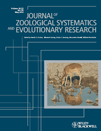
JOURNAL OF ZOOLOGICAL SYSTEMATICS AND EVOLUTIONARY RESEARCH
Scope & Guideline
Illuminating the Pathways of Animal Evolution
Introduction
Aims and Scopes
- Molecular Systematics:
The journal emphasizes molecular techniques, including DNA sequencing and phylogenomics, to resolve phylogenetic relationships and assess genetic diversity among species. - Morphological Studies:
It also values traditional morphological analyses, contributing to taxonomic revisions and the understanding of evolutionary adaptations and ecological niches. - Biodiversity and Conservation:
Research addressing biodiversity patterns, endemism, and conservation strategies for various taxa is a core focus, reflecting a commitment to the understanding and preservation of global biodiversity. - Integrative Taxonomy:
The journal promotes integrative approaches that combine molecular, morphological, and ecological data for species delimitation and understanding evolutionary processes. - Phylogeography:
Studies on the geographic distribution of genetic lineages and historical biogeography are highlighted, providing insights into the effects of climatic and geological changes on species evolution.
Trending and Emerging
- Hybridization and Admixture Studies:
There is an increasing focus on hybridization events and genetic admixture, particularly in understanding species boundaries and evolutionary dynamics in hybrid zones. - Mitogenomics and Genomic Approaches:
Research employing mitogenomic data and advanced genomic techniques is on the rise, enabling deeper insights into phylogenetic relationships and evolutionary history. - Climate Change Impacts on Biodiversity:
Studies examining the effects of climate change on species distribution, genetic diversity, and evolutionary processes are gaining traction, highlighting the relevance of conservation biology. - Cryptic Diversity and Speciation:
Research addressing cryptic species complexes and the use of integrative taxonomy to uncover hidden diversity is increasingly prevalent, emphasizing the importance of genetic and morphological data. - Conservation Genetics:
There is a notable trend towards conservation genetics, focusing on genetic management of endangered species and understanding the implications of genetic diversity for conservation efforts.
Declining or Waning
- Traditional Taxonomic Descriptions:
While taxonomic descriptions remain relevant, there has been a noticeable decline in papers focused solely on describing new species without integrating molecular data, as the field moves towards a more holistic approach. - Ecological Studies without Genetic Component:
Studies that focus exclusively on ecological aspects or behavior without a genetic or phylogenetic context have become less prominent, reflecting a trend towards integrating multiple disciplines in research. - General Surveys of Fauna:
Broad surveys of faunal diversity or distribution are appearing less frequently, likely due to a shift towards more targeted studies that focus on specific ecological or evolutionary questions.
Similar Journals
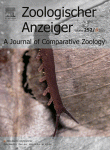
ZOOLOGISCHER ANZEIGER
Unraveling Nature's Mysteries with Rigorous ResearchZoologischer Anzeiger is a prestigious peer-reviewed journal published by Elsevier GmbH in Germany, dedicated to advancing the fields of Animal Science and Zoology. With its consistent ranking in the Q1 category for both disciplines and a commendable Scopus rank of #165 out of 490, it stands out as a leading platform for innovative research and critical reviews in zoological sciences. The journal has been in continuous publication since 1961, navigating through different converged years, and remains a vital resource for researchers, professionals, and students aiming to deepen their knowledge and contribute to the dynamic field of zoology. Although it does not offer open access, the journal ensures that its content adheres to the highest standards of academic integrity and rigor, making it an essential read for anyone serious about animal biology and ecological studies. For research excellence and impactful scholarly discussions, Zoologischer Anzeiger is indispensable.

European Journal of Taxonomy
Illuminating the path to a deeper understanding of nature.The European Journal of Taxonomy is a distinguished open access journal, published by the MUSEUM NATL HISTOIRE NATURELLE in France, dedicated to the rich and dynamic field of taxonomy, ecology, and systematics. Since its inception in 2011, this journal has aimed to provide a platform for the dissemination of high-quality research and innovative methods relevant to the study of biodiversity and species classification. With a commendable Q2 ranking in the Ecology, Evolution, Behavior and Systematics category as of 2023, the journal ranks 380 out of 721 in Scopus, highlighting its pivotal role in advancing scientific knowledge in these essential areas. Researchers and students alike will find valuable resources and contributions that address pressing ecological and evolutionary questions from 2015 to 2024. By promoting open access, the European Journal of Taxonomy ensures that vital research is accessible to a broader audience, fostering collaboration and discourse among professionals striving to enhance our understanding of the natural world.
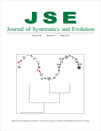
Journal of Systematics and Evolution
Bridging Disciplines in Ecology and Plant ScienceThe Journal of Systematics and Evolution, published by WILEY, is a premier academic journal dedicated to advancing the fields of Ecology, Evolution, Behavior, and Systematics and Plant Science. With a distinguished Q1 ranking in both of these critical categories in 2023, it stands at the forefront of scientific research, placing it in the top quartile among its peers. Featuring both an ISSN of 1674-4918 and an E-ISSN of 1759-6831, the journal has been converging innovative research since its inception in 2008. The journal caters to a global audience of researchers, professionals, and students, providing a platform for disseminating significant findings and fostering academic dialogue. Its impressive Scopus rankings further affirm its impact, coming in at Rank #62/721 in Ecology and Rank #48/516 in Plant Science, highlighting its relevance and influence in these vibrant fields. As an open-access journal, it ensures that groundbreaking research is accessible to all, thus enhancing collaborative opportunities within the scientific community.

BRITTONIA
Unveiling Nature's Secrets: A Journey Through Plant SciencesBRITTONIA, published by Springer, stands as a reputable journal dedicated to advancing the fields of botany and plant sciences. With a storied history dating back to 1931, this journal has evolved to embrace contemporary research spanning various aspects of plant biology, ecology, and systematics. Focusing on a comprehensive analysis of both ecological interactions and plant systematics, BRITTONIA plays a crucial role in disseminating knowledge among researchers and professionals committed to understanding plant life and its environmental contexts. Despite its open access status being currently unavailable, the journal ensures wide accessibility through institutional subscriptions. In the latest rankings, it proudly holds a Q2 category in Plant Science and a Q3 category in Ecology, Evolution, Behavior, and Systematics, indicating its growing influence and academic rigor. Researchers and students alike will find BRITTONIA an essential resource for the latest findings and discussions in plant sciences.

RECORDS OF THE AUSTRALIAN MUSEUM
Advancing Knowledge in Natural History and Cultural HeritageRecords of the Australian Museum is a leading journal in the fields of Animal Science, Ecology, History, and Museology, published by the renowned Australian Museum in Sydney, Australia. With a commitment to advancing knowledge and understanding of natural history and cultural heritage, this journal provides an essential platform for original research, reviews, and significant findings relevant to its diverse academic audience. The journal encompasses a broad scope, including studies in ecology, evolution, behavior, systematics, and the history of science, attracting contributions from leading scholars and professionals. Notably, it ranks highly in various categories, achieving a Q1 ranking in History and Museology, reflecting its impact and prestige within the academic community. Although it operates under a traditional access model, the journal ensures that its robust compilation of cutting-edge research remains vital to researchers, professionals, and students aiming to stay informed of the latest developments in their fields. With converging years of publication since 1983, Records of the Australian Museum continues to play a pivotal role in disseminating critical insights and fostering discussions that shape our understanding of both the natural world and our cultural heritage.
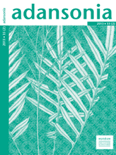
ADANSONIA
Innovating research in the heart of plant biology.ADANSONIA is a distinguished, peer-reviewed open access journal dedicated to advancing the field of plant science. Published by the Publications Scientifiques du Museum in Paris since 2000, this journal serves as a critical platform for sharing innovative research and discoveries in botany, ecology, and related disciplines. With its ISSN 1280-8571 and E-ISSN 1639-4798, ADANSONIA boasts a notable Scopus rank of #383 in the Agricultural and Biological Sciences category and a 2023 category quartile ranking of Q3 in Plant Science, indicating a meaningful contribution to the academic community. The journal's scope encompasses a broad range of topics, making it a vital resource for researchers, professionals, and students alike who are exploring the complexities of plant biology. Based in France, ADANSONIA not only enhances visibility for groundbreaking research but also facilitates open communication amongst scholars, ensuring that knowledge on plant science is accessible worldwide. Located at CP 39-57, Rue Cuvier, F-75231 Paris Cedex 05, France, this journal stands as a testament to the collaborative efforts in the pursuit of scientific excellence in plant sciences.

INSECT SYSTEMATICS & EVOLUTION
Innovating Understanding of Insect SystematicsINSECT SYSTEMATICS & EVOLUTION is a prestigious journal published by BRILL, which has been a vital source of scholarly information since its inception. Specializing in the fields of ecology, evolution, behavior, and systematics within the realm of insect science, this journal garners significant attention with its 2023 ranking in the second quartile across multiple categories, highlighting its relevance and impact in the field. With a focus on advancing knowledge through innovative research and reviews, it serves as an essential platform for researchers, professionals, and students alike, promoting an understanding of insect biodiversity and systematics. The journal’s accessibility options, including its Open Access policy, combined with a broad international scope, ensure that critical findings reach a diverse audience, fostering collaboration and discourse within the scientific community. Situated in the Netherlands, INSECT SYSTEMATICS & EVOLUTION maintains its commitment to excellence and strives to contribute actively to the ongoing dialogue in insect science, making it a must-read for anyone interested in the intricate world of insects.

CONTRIBUTIONS TO ZOOLOGY
Shaping the Future of Zoological ResearchCONTRIBUTIONS TO ZOOLOGY, published by BRILL, is a premier scholarly journal dedicated to advancing the field of zoological sciences. With an ISSN of 1383-4517 and an E-ISSN of 1875-9866, this journal serves as a vital platform for researchers, professionals, and students seeking to share their findings and insights related to animal science, ecology, evolution, and systematics. Recognized for its high academic standards, it ranks in the top quartile (Q1) for Animal Science and Zoology, and Q2 for Ecology, Evolution, Behavior, and Systematics, reflecting its significance and influence in the scholarly community. The journal has been consistently published since 1994 and continues to contribute pivotal knowledge that informs and shapes contemporary zoological research. Researchers can access the journal through traditional subscription models, ensuring broad dissemination of its impactful articles and studies. Contributions to Zoology plays an essential role in fostering collaboration and discussion within the zoological community in the Netherlands and beyond.
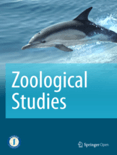
ZOOLOGICAL STUDIES
Connecting research and impact in zoological studies.Zoological Studies, published by the Biodiversity Research Center, Academia Sinica, stands as a pivotal journal in the fields of animal science and zoology. With the ISSN 1021-5506 and E-ISSN 1810-522X, this Taiwanese journal features a blend of pioneering research that spans over three decades, from 1994 to 2024, fostering a deep understanding of biodiversity and zoological phenomena. Recognized for its scholarly contributions, Zoological Studies holds an esteemed Q2 ranking in Animal Science and Zoology for 2023, positioning it among the top-tier journals in its category with a Scopus rank of #164 out of 490—reflecting its strong impact and outreach. While currently not open access, the journal aims to disseminate essential findings and discussions that advance ecological knowledge and inspire future research endeavors. Researchers, professionals, and students alike will find this journal an invaluable resource for accessing critical studies that drive innovation and conservation efforts in the field of zoology.
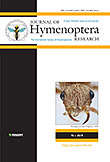
JOURNAL OF HYMENOPTERA RESEARCH
Pioneering Insights into the World of HymenopteraJOURNAL OF HYMENOPTERA RESEARCH is a leading open-access publication dedicated to the advancement of knowledge in the fields of Insect Science, Animal Science and Zoology, and Ecology. Published by Pensoft Publishers since 2011, this journal plays a critical role in facilitating the exchange of significant research findings and insights related to Hymenoptera, a diverse order of insects that includes bees, wasps, and ants. With a commendable impact factor and ranked in the Q1 category for Insect Science and Animal Science, the journal stands out within the scientific community, drawing contributions from researchers globally. Boasting an ISSN of 1070-9428 and an E-ISSN of 1314-2607, the journal not only ensures broad accessibility to its content but also fosters a collaborative environment for professionals and students alike to engage with pioneering research. By reflecting on the converged years of 2007-2024, the JOURNAL OF HYMENOPTERA RESEARCH remains a vital resource for understanding the ecological and evolutionary dynamics of this important group of insects, solidifying its position as a cornerstone in entomological studies.